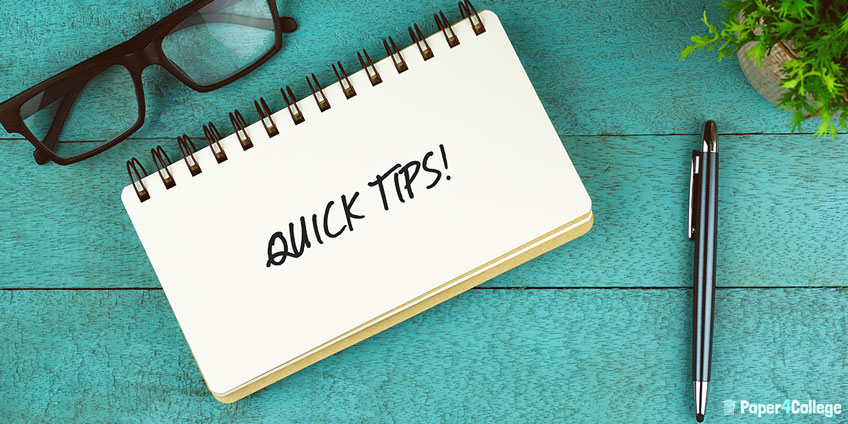Essay Writing: Tips. Part 1

If you want to write a composition, you will pass the following steps: thinking over, planning, writing, checking, and correcting. Therefore, in case you are aimed at completion of perfect essay papers, you need to follow these stages in the given sequence.
Planning
Planning is the determination of the purpose of an essay to write, its main ideas, sources of information, deadlines for writing and submitting.
- Purpose. The purpose should define the actions and things you write about.
- Ideas. Ideas should be concrete or general, abstract. Your thoughts, feelings, and views may be added in the form of analogs, associations, suppositions, evaluations, arguments, etc.
- Sources. The essay topic will help you in the determination of where to find good sources. Usually, you may benefit from the library, Internet resources, dictionaries, etc.
- Clarity. This is the comprehension level of a text. To make your text clear, plan the logic of your text building, and make all the words, phrases and paragraphs interconnected and serving the same aim.
- Grammatical correctness. It is necessary to follow the grammar rules. If you doubt a certain structure or spelling, it is better to check the dictionary and a grammar handbook. It is also possible to give your essay to your friend who is good at writing. It is an excellent idea to double check everything than to get a low grade just because of some minor inaccuracies.
- Tolerance. When planning, cross off all the biased ideas and intolerant arguments. You should be persuasive but always respectful.
Techniques of Text Composition
There are a few techniques which help to put your thoughts in a clear order not only for yourself but for others as well.
- Chronology. For your professor not to get lost in events, you should learn to smoothly go from one case to another. Use the sequence of events for this purpose. However, there is a risk to get a boring composition. You should better not pay too much attention to time, just mention it here and there. There is also no need to depict everything that was taking place in the given period. Your central point should be the topic, and only what is relevant should be included in your text.
- Events adding. With the help of this technique, your essay will turn into a story. In the process of writing, you may put an emphasis on certain qualities, possibilities or information, and argument your point of view but only if this is connected to the topic of your essay.
- Description. This technique is close to events adding, but having a certain story is not mandatory. You will need to be creative and have a vivid imagination, supported by the usage of metaphors and interesting details. The benefit of this technique is that a reader remains under impression for a long time. Moreover, the details remain in the memory, and thus the writer of an essay will be recognized by a professor.
- Comparison. This technique is good to apply for essays where you need to cover, for example, an experience or a failure. However, as everything can be understood via comparison, you may write on any topic using this technique. It will make your essay sharp and impressive.
Effective Beginning

Now, it seems that all you need is just to sit and write. Nevertheless, finding a perfect beginning for your work also means a lot in writing essays.
The beginning helps your reader to determine whether your essay is worth reading. The opening of each paragraph plays nearly the same role. Therefore, the first phrase of your essay should make your professor not only read it and put aside, but remember it! To make your text extraordinary, there are a few options.
- Standard. This is a most widely used one but not really boring. To start your essay this way, you need to answer 6 questions: who, what, when, where, why and how. Answering these questions should help your reader to find out what is going to happen. Despite the quantity of the questions, the answers should fit in no more than 1 paragraph.
- Unexpected. Such an approach shocks and impresses. You may start with anything you want. Your beginning may have a minimal link to what you are going to write about. The weaker the link, the bigger the impression.
- Full of actions. Such an opening makes a reader get immersed in the process, reasons and consequences that come next. This approach is good for short essays where there is no need to describe everything in detail. You just throw your reader into the actions and the main problem, and they figure out what is happening when reading your essay.
- Authoritarian. This approach suggests providing information in an imperative mood, and this, no wonder, impresses a reader. It seems that the author is certain only about himself/herself.
- Informative. A reader may get a hint about what is going to be next. The intrigue may be a bit lost, but the beginning will be impressive.
- Quotation. You may choose a good quote to start your essay, but it should be relevant to the paper topic. Do not use sayings that are well-known for everybody: this is boring and banal.
- Dialogical. This approach sets the tone of the text as a dialogue with a reader. However, this may also be a flow of thoughts in the form of rhetoric questions.
Read the continuation of this article on the paper4college.com website blog.
